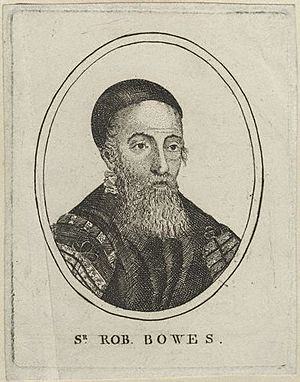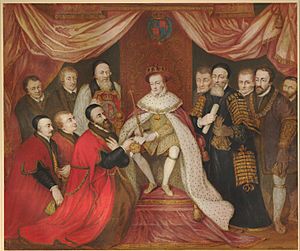Robert Bowes (lawyer) facts for kids
Quick facts for kids
Sir Robert Bowes
|
|
|---|---|

Sir Robert Bowes
|
|
| Born | c. 1492 |
| Died | 28 February 1555 Berwick Castle |
| Spouse(s) | Alice Metcalfe |
| Issue | several children who died young |
| Father | Sir Ralph Bowes |
| Mother | Margery Conyers |
Sir Robert Bowes (born around 1492 – died 28 February 1555) was an important English lawyer and military leader. He played a big role in managing the border areas between England and Scotland during his time.
Contents
Early Life and Family
Robert Bowes was the son of Sir Ralph Bowes. His family lived in a place called Streatlam in Durham, England. His mother was Margery Conyers. Robert had four brothers and six sisters. His family was well-known in the northern parts of England.
Career as a Border Leader
Robert Bowes studied law when he was young. But because his family was from the border region, he often worked on matters between England and Scotland. This area was known as the "Border country."
Helping the King
In 1536, Robert was part of the king's army. He helped against a protest known as the Pilgrimage of Grace. He even carried a message from the protesters to the king.
In 1541, he was called to London. The king's special advisors, called the privy council, wanted his advice on issues with Scotland.
Battles and Raids
In 1542, Robert joined a military mission into Scotland. He led about 3,000 men to an area called Jedburgh. On the way, his group was attacked at the Battle of Haddon Rig. He was captured but was set free soon after.
Later, in 1545, Robert led a group of 1,500 horsemen. They rode through Scottish lands, burning towns and crops. This was part of the ongoing conflicts between England and Scotland.
Warden of the Marches
In 1550, Robert Bowes became the "warden of the east and middle marches." A warden was like a governor or protector of the border areas. It was his job to keep peace and manage affairs along the border.
Working for the Government
In 1551, Robert was chosen to help make an agreement with Scotland. This shows how much the government trusted him. Later that year, he became a member of the privy council, which was a group of the king's closest advisors.
He also held important jobs in London:
- In November 1551, he became the Master of the Savoy. This was a royal hospital and charity.
- In June 1552, he became the Master of the Rolls. This was a very important legal position, in charge of keeping official records and documents.

Robert Bowes was one of the people who signed the will of Edward VI, the young king. After Edward VI died, Robert was briefly part of the council that supported Lady Jane Grey as queen. However, this council did not last long.
When Queen Mary came to power, Robert Bowes was not punished. He continued as Master of the Rolls for two months, then decided to step down. In 1554, he was asked to go to Berwick. His job was to help organize the defenses of the border once more. He died soon after returning from this duty, in February 1555.
Robert Bowes was married to Alice Metcalfe. They had several children, but sadly, none of them lived to adulthood.
His Writings and Legacy
As a Warden, Robert Bowes was very good at managing things. He wrote a special book called A Book of the State of the Frontiers and Marches betwixt England and Scotland. This book is very important because it tells us a lot about what the border country was like in the 1500s.
His book described:
- The land itself.
- How the military was organized.
- The condition of the forts.
- The number of soldiers.
- Information about the people living on the border.
Because he was also a lawyer, he added a legal guide to his book. This guide explained the complex laws used to solve problems between people from England and Scotland. He also wrote The Forme and Order of a Day of Truce. This explained the rules for holding special meetings where wardens from both countries would settle disputes.
Robert Bowes's writings are still used today by historians to understand the history of the English-Scottish border.
 | Claudette Colvin |
 | Myrlie Evers-Williams |
 | Alberta Odell Jones |

